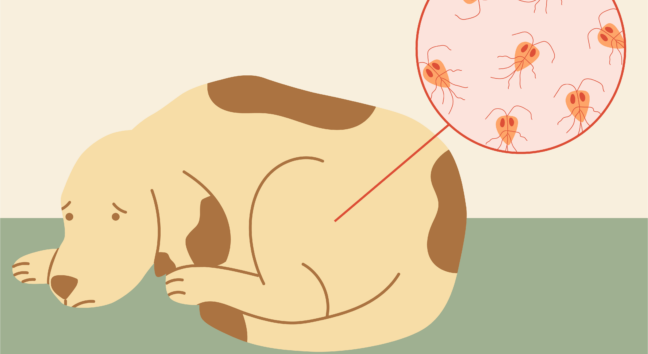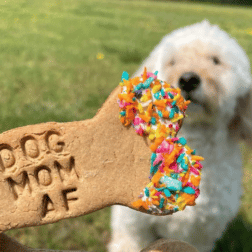Dr. Brett Shorenstein (aka The Dogtor) is a general practitioner and owner of Abingdon Square Veterinary Clinic in New York, NY. He is a USDA-accredited Veterinarian whose professional interests include internal medicine, dermatology, and nutrition. If you have a question for The Dogtor send a message to woof@dogspotted.com.

www.dailypaws.com
Advice from the DOGtor | Fleas, Giardia, Separation
www.dailypaws.com
Dear Dogtor,
We recently adopted our dog, Hazel, from a shelter. She’s a 20LB mutt who is sweet as can be. However, we realized within two days she had fleas and giardia. Is this normal? What is the best treatment for these conditions and what would you recommend to new adopting parents when bringing a dog home? I have a lot of friends adopting dogs during COVID-19 and any tips to best prepare would be really helpful!

Dear New Dog Mom,
Congratulations on your new furry family member! Hazel is lucky to have you, and it sounds like you feel just as lucky to have her!
To answer your question, yes, fleas and giardia are common issues we see in rescue animals, likely due to a lack of preventative care prior to their arrival at the shelter. Fleas are common in stray dogs and cats who aren’t on preventative medication and can be difficult to control in animals being transferred through multiple rescues or homes.
Stray dogs can also get giardia doing what they love to do: rolling in contaminated soil or feces and then licking themselves, or drinking from contaminated creeks or puddles! As you can imagine, the risk of giardia is higher for stray or neglected animals who may be roaming or left unsupervised. Most shelters and fosters work with a Veterinarian to clear up any infections prior to placing a pet for adoption, but problems can linger from time to time. The good news is that both of these issues are easily corrected with the help of your Veterinarian.
You may have heard by now that sheltering in place has led to empty cages at your local shelter. In fact, if you’re one of many who recently adopted during the pandemic — perhaps to help relieve stress or fend off loneliness, or perhaps because the timing just felt right. Whatever the reason, we’re glad you did — and I’m sure Hazel is too! As a Veterinary professional, one of my greatest joys is helping clients welcome these new family members into their homes. When you adopt from a shelter, you are saving not one life, but two: That of the pet you take home, and that of the one that can take the space you’ve made available.
But it’s not just your new pet’s quality of life that improves when you bring them home. Yours does, too! Pets keep us company, which can help us feel less lonely — especially in times of isolation, as most of us are experiencing now. We’re also experiencing unprecedented levels of stress and anxiety, and it’s well known that loving animals can help provide some relief by reducing levels of cortisol (the human stress hormone). They also bring us joy, which we all need an extra dose of these days!
As COVID-19 restrictions ease, keep in mind that changes to your routine may impact your new pet. After all, the only lifestyle of yours they’ve ever known involves you being present for the vast majority of every day. To help them acclimate to a new schedule and prevent separation anxiety, consider practicing separations early. Leave your pet alone for varying periods of time and keep an eye out for warning signs of separation anxiety (destructive behavior, crying, potty training regression, etc.). We can help nervous dogs by providing a food puzzle for example. Work on gradually increasing the time you are gone while minimizing the significance of your absence by avoiding enthusiastic “hellos” and “goodbyes.” In time, Hazel will come to learn that your absences are safe. If your dog demonstrates warning signs of separation anxiety and you feel you may need behavioral training assistance, don’t hesitate to reach out for support. Dog Spotted has training resources on their sister Instagram account, @spotsadoptablefriends.
Most Veterinary practices offer behavioral counseling and anxiety medications, and will also recommend behaviorists who can help. Many local training facilities are also launching online training classes (Dog Spotted is a big fan of Calm Canine Academy and with promo code: CALMSPOTTED50 – you get 50% off your first service.)
And whether you’re a new dog parent or have had dogs all your life, your Veterinarian can help you with everything from nutrition to behavior. Make annual visits a part of your dog’s routine!
Good luck to you and Hazel,
The Dogtor

Fleas and Giardia are common issues we see in rescue animals, likely due to a lack of preventative care prior to their arrival at the shelter.




Warning: Attempt to read property "roles" on bool in /home/u209698259/domains/dogspotted.com/public_html/wp-content/themes/my-listing-child/include/sd-walker.php on line 52
Fatal error: Uncaught TypeError: in_array(): Argument #2 ($haystack) must be of type array, null given in /home/u209698259/domains/dogspotted.com/public_html/wp-content/themes/my-listing-child/include/sd-walker.php:52 Stack trace: #0 /home/u209698259/domains/dogspotted.com/public_html/wp-content/themes/my-listing-child/include/sd-walker.php(52): in_array() #1 /home/u209698259/domains/dogspotted.com/public_html/wp-includes/class-wp-walker.php(150): MyListing\Ext\Reviews\SD_Walker->start_el() #2 /home/u209698259/domains/dogspotted.com/public_html/wp-includes/class-wp-walker.php(397): Walker->display_element() #3 /home/u209698259/domains/dogspotted.com/public_html/wp-includes/comment-template.php(2415): Walker->paged_walk() #4 /home/u209698259/domains/dogspotted.com/public_html/wp-content/themes/my-listing-child/comments.php(50): wp_list_comments() #5 /home/u209698259/domains/dogspotted.com/public_html/wp-includes/comment-template.php(1629): require('/home/u20969825...') #6 /home/u209698259/domains/dogspotted.com/public_html/wp-content/themes/my-listing-child/custom-single.php(117): comments_template() #7 /home/u209698259/domains/dogspotted.com/public_html/wp-includes/template.php(812): require('/home/u20969825...') #8 /home/u209698259/domains/dogspotted.com/public_html/wp-includes/template.php(745): load_template() #9 /home/u209698259/domains/dogspotted.com/public_html/wp-includes/general-template.php(206): locate_template() #10 /home/u209698259/domains/dogspotted.com/public_html/wp-content/themes/my-listing-child/single.php(13): get_template_part() #11 /home/u209698259/domains/dogspotted.com/public_html/wp-includes/template-loader.php(106): include('/home/u20969825...') #12 /home/u209698259/domains/dogspotted.com/public_html/wp-blog-header.php(19): require_once('/home/u20969825...') #13 /home/u209698259/domains/dogspotted.com/public_html/index.php(17): require('/home/u20969825...') #14 {main} thrown in /home/u209698259/domains/dogspotted.com/public_html/wp-content/themes/my-listing-child/include/sd-walker.php on line 52